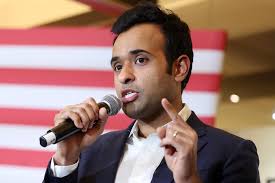Vivek Ramaswamy: A Multifaceted Entrepreneur and Political Figure

generation Indian-American, Ramaswamy’s rise to prominence has been driven by his innovative work in the biotech industry, his contributions to the culture wars in American politics, and his ambition to reshape the political landscape in the U.S. As of late 2024, he has garnered widespread attention as a Republican candidate for the presidency. Ramaswamy’s journey from a biotech entrepreneur to a political figure offers insight into the ways in which business acumen, intellectual thought, and cultural values intersect in modern American politics.
Early Life and Education
Vivek Ramaswamy was born on August 9, 1985, in Cincinnati, Ohio, to Indian immigrant parents. His father, a chemical engineer, and his mother, a psychiatrist, both immigrated to the U.S. from India in pursuit of better opportunities. Raised in a family that valued education and hard work, Ramaswamy was encouraged to excel academically. His upbringing in an immigrant household shaped his views on the importance of personal responsibility, meritocracy, and the American dream.
Ramaswamy attended Harvard University, where he earned a degree in biology. Known for his intellectual curiosity, he also studied philosophy, political science, and economics during his time at Harvard. His experience in the Ivy League shaped much of his worldview, particularly his deep skepticism of government intervention in markets and his belief in free-market capitalism.
After completing his undergraduate degree, Ramaswamy pursued a law degree at Yale Law School, where he further honed his skills in analysis, argumentation, and strategic thinking. His time at Yale exposed him to a range of intellectual ideas, but he remained committed to the principles of individual liberty, free markets, and limited government.
The Rise of Roivant Sciences
Vivek Ramaswamy’s entrepreneurial career took off when he founded Roivant Sciences in 2014. Roivant is a biotechnology company focused on accelerating the development of medicines. The company operates by acquiring underdeveloped or abandoned drug candidates and bringing them through the regulatory process faster than traditional pharmaceutical companies. The business model is built on the premise of identifying the most promising treatments that have been left behind by other companies, giving them new life and ultimately leading to faster and more efficient delivery of medicine to patients.
Roivant’s approach to innovation in the biopharmaceutical industry caught the attention of investors and entrepreneurs alike. The company raised substantial funding from venture capitalists, and Ramaswamy’s leadership was widely recognized as a key factor in the company’s success. One of Roivant’s most notable achievements was its acquisition of a promising drug candidate for psoriasis, which was eventually approved by the FDA under the brand name “Taltz.” This breakthrough not only validated Roivant’s business model but also cemented Ramaswamy’s reputation as a visionary in the biotech field.
Ramaswamy’s success with Roivant Sciences led to his growing stature as a business leader. He became known for his ability to navigate the complex world of biotechnology and healthcare while simultaneously advocating for market-driven solutions to the problems of medical innovation. His approach emphasized speed, efficiency, and profitability in a sector traditionally known for its high-risk, high-reward investments.
Public Criticism of Woke Capitalism
In addition to his entrepreneurial success, Vivek Ramaswamy has become a vocal critic of what he refers to as “woke capitalism.” He believes that the rise of social justice movements and the increasing focus on issues such as racial equity, environmentalism, and gender identity within major corporations is undermining the free-market principles that he holds dear. Ramaswamy argues that businesses should focus on profits and shareholder value rather than becoming involved in political and social causes.
In his 2021 book Woke, Inc.: Inside Corporate America’s Social Justice Scam, Ramaswamy outlines his critiques of the intersection between politics and business. The book became a best-seller and earned Ramaswamy significant attention from conservatives and libertarians who shared his concerns about the growing influence of progressive politics in the corporate world. Ramaswamy’s central argument in Woke, Inc. is that companies are using social justice initiatives to distract from their pursuit of profit and to protect their public image, often at the expense of their shareholders. He contends that this corporate “wokeism” undermines the integrity of free markets and distorts the role of businesses in society.
Ramaswamy’s book sparked a national conversation about the role of corporations in political activism. His critique resonated with many who were frustrated with the increasing politicization of business, especially in the wake of movements like Black Lives Matter, Me Too, and the global push for climate change action. Ramaswamy’s position attracted praise from those on the right who were concerned about cancel culture and the power of corporate elites to shape societal values.
Political Ambitions and Presidential Candidacy
Ramaswamy’s critiques of corporate America, along with his success as an entrepreneur, set the stage for his entry into the political arena. In 2023, he announced his candidacy for the 2024 Republican nomination for president. His political platform reflects many of the ideas he championed in his business career: limited government, free-market capitalism, and a strong national defense. He also emphasizes the importance of restoring American values and culture, particularly in the face of what he sees as a moral and cultural decline in the U.S.
Ramaswamy’s political ideology is rooted in a belief in classical liberalism, which stresses individual liberty, personal responsibility, and the importance of institutions that protect these freedoms. He has called for reforms to the regulatory state, reductions in government spending, and a more aggressive foreign policy to counter China’s rise. His political approach combines economic conservatism with a cultural conservatism that appeals to many Republicans disillusioned with the traditional political establishment.
One of Ramaswamy’s key proposals during his presidential campaign is to challenge the “deep state,” which he believes is an entrenched bureaucracy that undermines the will of the American people. He has spoken out against the influence of big government in all areas of life, from education to healthcare to foreign policy. He argues that the government should get out of the way of businesses and individuals, allowing the free market to work its magic.
In addition to his economic proposals, Ramaswamy has focused on issues related to national identity and cultural preservation. He is a staunch critic of identity politics, multiculturalism, and what he describes as “wokeness.” Ramaswamy believes that American culture is under attack from forces within the government, academia, and the media, and he has promised to restore pride in the country’s traditions and values. His platform calls for a return to the ideals of the founding fathers, including a commitment to individual liberty, limited government, and free enterprise.
Despite his outsider status, Ramaswamy has gained significant attention in Republican circles due to his willingness to challenge the political establishment and his ability to articulate a clear vision for America’s future. His campaign is appealing to younger, more conservative voters who are dissatisfied with the status quo and are looking for new leadership that embraces both economic and cultural conservatism.
Public Reception and Controversies
Vivek Ramaswamy has been a polarizing figure in American politics. Supporters praise him for his intellectual rigor, boldness, and commitment to American values. Many see him as a fresh face who is not beholden to the political elites and who is willing to challenge the forces that they believe are undermining American society. His success as a businessman adds to his credibility, as he is viewed by some as someone who has “walked the walk” and not just “talked the talk.”
On the other hand, critics argue that Ramaswamy’s views on corporate America, government regulation, and cultural issues are simplistic and unrealistic. Some detractors have accused him of using incendiary rhetoric to generate attention rather than offering substantive policy solutions. Additionally, some question whether his outsider status can translate into effective leadership, especially given the complex challenges facing the U.S. on the world stage and at home.
Ramaswamy’s criticisms of corporate “wokeness” have also led to accusations that he is out of touch with the realities of the modern business world. Critics contend that his ideas on government regulation and corporate responsibility ignore the ways in which businesses are increasingly called upon to address social and environmental issues.
Personal Life and Legacy
Outside of his professional endeavors, Vivek Ramaswamy is known for his family-oriented values and his commitment to personal fitness. He is married to Apoorva Tewari, a physician, and the couple has children. Ramaswamy is also passionate about philosophy and often references his intellectual influences, including figures like Friedrich Hayek and Milton Friedman.





